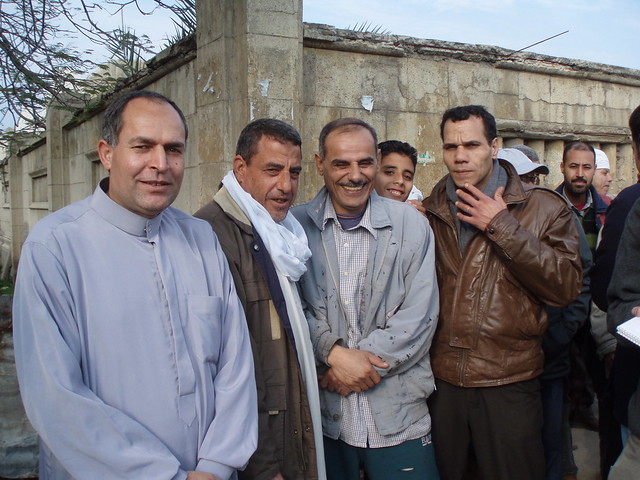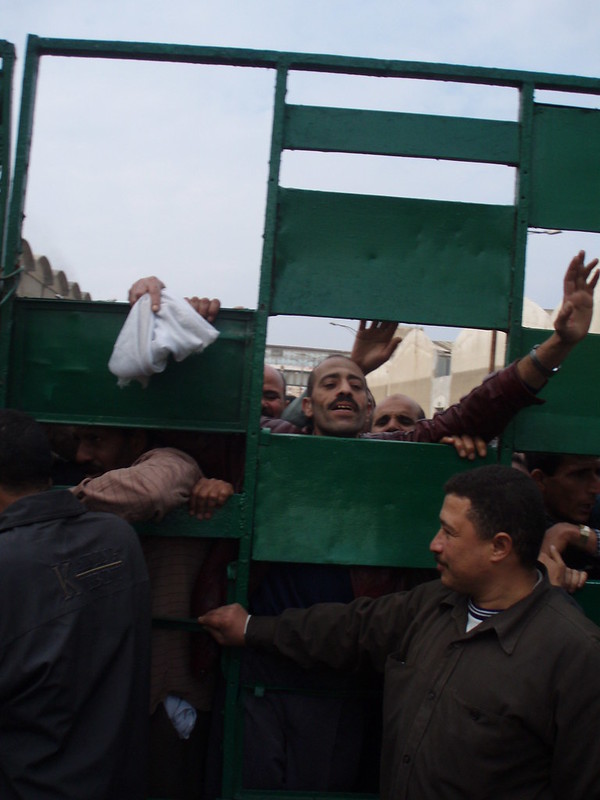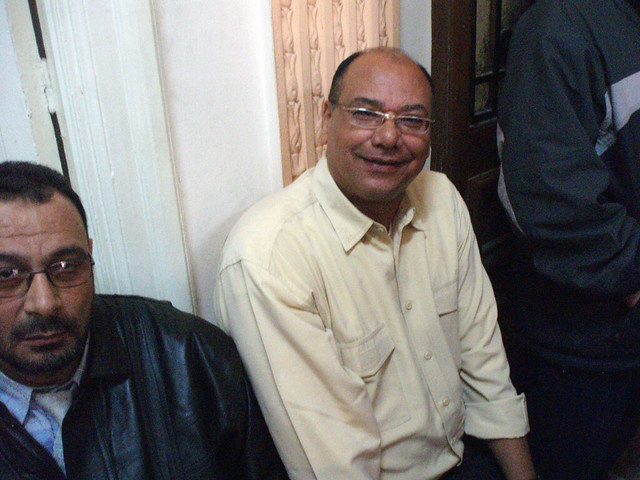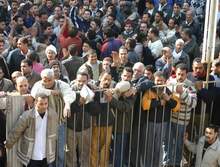The strikes of Ghazl Shebeen and Kafr el-Dawar were suspended on Thursday, after the workers achieved VICTORY!
I’m still having IT/phone problems, so did not post about this earlier. Apologies to all those who’ve been sending emails, but I just can’t log into my account at the moment. Thanks for your patience. Stay tuned for a long report about the strikers’ victory and other updates…
[Above: Photo I took of Kafr el-Dawar strikers celebrating their victory.]
UPDATE: Here’s a report about my trip to Kafr el-Dawar:
I took off to Kafr el-Dawar, on Thursday, with a group of left-wing Egyptian journalists and some Cairo-based foreign reporters and photographers, to try to meet the strikers.
Work had come to complete halt at the factory, with 14 demands (printed on the banner below) the strikers wanted. The most important of which were the following:
[Above: Photo I took of the banner reading the workers’ demands, hung inside the factory.]
1-The workers wanted to get paid 45-day bonus, just like what their comrades in Mahalla were given. The management initially was offering 15 days, and then raised it after the strike to 21 days.
2-The workers wanted to raise their monthly food allowance, which had stagnated at LE32
3-The workers wanted to upgrade the medical clinic in the factory, which has been proven incompetent.
4-The company had stopped administrative promotions since 1995. The workers wanted this to be revoked, in addition to speeding promotions for those workers who managed to earned diplomas and university degrees.
5-The bonuses are a function of the production plan the workers have to complete. One big problem though was the production items were priced with 1960 prices (!), which makes the bonuses basically peanuts.
We arrived in the afternoon. Before entering, we were receiving reports from the town about increased police presence, with security forces deployed around the factory and in other parts in the city.
Rumors were circulating that Minister of Labor Aisha Abdel Hadi was to visit the factory to negotiate with the workers. We called the minister’s office on the way, but her secretary refused to disclose any details.
The Kafr el-Dawar Textile Company looked like one hell of a citadel/prison with high walls, surrounding the compound which stretches over 500 feddans. Within its walls, lies the factory, as well as residential villas of the managers and the company’s security chief.
[Above: Photo I took of Kafr el-Dawar’s compound.]
Plainclothes security agents were stationed on the gates, blocking access into the compound. We managed to get in, telling the thugs we were from the press. They allowed us into the compound, but not into the factory proper, where the strikers had taken control. We were instructed to meet the company managers, who were to decide whether to allow us into the factory or not.
As we approached the villa where the CEO was living, I was SHOCKED to find out that the Kafr el-Dawar State Security office is located INSIDE the factory compound itself!
We were received by company chairman Ali Ghallab and his aide (from the Holding Company) Raafat Geneidi.
The two were accompanied by an NDP official, Ahmad el-Sawi. They led us into the villa, whose entrance was decorated with Mubarak’s framed photo.
The managers threw all the blame on the Muslim Brotherhood, and said the strikers were basically a bunch of thugs, who have taken the rest of the factory workers as hostages. “The workers inside the factory want to leave, but they are imprisoned by a group of thugs who are leading the strike,” Ghallab said.
We asked for proof regarding the Brothers’ involvement, reminding the manager they hardly had presence among working class circles in general. The only thing the managers could give us was that fact that the MP for the constituency was Zakaria el-Ganaini of the MB. They also told us there were no hunger strikers inside the factory. When we told them there were reports of workers who are on a hunger strike and some of which had to be transferred to hospitals, the managers said these were old workers with medical problems who were passing out as the “striking thugs” were banning them from leaving. I tried hard not to crack up. Meanwhile, a young State Security agent came in and took down our names.
We were getting increasingly anxious about getting access into the factory, and tried to pressure and/or charm our way in. But, the managers said it was not their call. “Go to the gates and ask the security there,” Ghallab said. The young SS agent advised me not to try, as he could “not guarantee my safety once inside. Those workers are dangerous,” he said.
We took off in our cars to the factory gates. There were probably two dozens of plainclothes security agents, and a uniformed Special Operations general. We went to the gates, only to be told that actually it was not their call, but it’s that of State Security Brigadier-General Hisham, who’s heading SS in Kafr el-Dawar. It was surreal. We were going back and forth between the SS office and the gates (and it was quite a drive, as the compound was huge).
Through the gates, we could see the strikers inside the factory, may be a kilometer away.
Around probably 2:30pm, some strikers who were roaming around outside the factory, trying to find a way to get inside, started assembling in front of our gate, seeing there were reporters.
We rushed to interview them, and the security did not intervene. We heard horrific stories about lack of medical treatment, ultra-low salaries, accusations of corruption against the labor union officials and the management. In addition, the workers vehemently denied any involvement from the MB. “If the NDP gets a nightmare during its sleep, they’ll blame also the Ikhwan,” one worker said sarcastically.
The workers also told us they’ve been trying to get food to their comrades inside. “We were initially banned, but then they couldn’t stop us, coz the town was going to eat them alive if they starved our brothers,” one worker told me.
We were still standing outside, when we heard the news over the phone that the Minister of Labor had agreed to most of the strikers demands, and that Beheira Governor (and former State Security General) Muhammad Sha’arawy was going to come himself to tell the workers the news, and ask them to suspend the strike.
Ahmad el-Sawy, the NDP official went into the factory. Few minutes later, we heard the fire alarm siren going off, shaking the whole compound. We learned later that the workers set it off, to alarm everyone in the factory to assemble to hear the NDP official. (Also, the workers during their strike used to trigger it every now and then to piss off the police, I was told later by a cab driver.)
Suddenly we heard cheers coming from the factory, and happy shouts.
Then, thousands of the strikers started running towards the gates where we were standing. They were shouting, cheering, and flashing victory signs.
The workers started pushing the gate, which seemed about to collapse. The security was panicking, and still asked us not to photograph. A foreign newswire photographer just started snapping pictures, and we followed. I politely asked a State Security agent in a brown leather jacket to step aside, unless he wanted to appear in the photos. He did step aside. But already the professional photographers had run inside snapping photos hysterically, and I was tailing them. Those photographers had covered wars before, so what seemed like a tense situation to me, was probably nothing to them.
The workers were euphoric, and were shouting “Long Live Justice!”
Shortly after 3:30pm, the governor arrived in his black Mercedez, accompanied by a caravan of SUVs full of SS agents and his body guards.
He went inside the factory, assured the workers that the president “loved” them, and that Mubark intervened personally to diffuse the situation, etc.
The governor read out loud in a mike what the govt has agreed up on, while Ahmad el-Sawy of the NDP held the mike:
1-The workers were to be paid 21-day bonus (not the initial 15 days offered by the management nor the 45 days the workers wanted.) But the food allowance was to be raised from LE32 to LE42.5. That will be applied retroactively from 1 July 2006, so actually the workers ended up with more than their 45 day bonus.
2-The government would buy a new ambulance car for the company’s medical clinic. The Ministry of Health would also send “medical caravans” to the factory to treat the emergency cases.
3-The freeze on promotions will be revoked; the workers’ pursuit of school and university degrees would also be taken into consideration when determining the promotions.
4-Pricing production items will be changed to match the current prices in the market. That’s expected to increase the bonuses.
5-Strike days will not be deducted from the workers’ salaries, and no victimization would follow.
The workers kept cheering their victory. But some angry shouts could still be heard among some denouncing the fact that some of the strikers’ demands were not met. Still over all the mood was EUPHORIC!
The workers were also excited to see activists and journalists from Cairo. They treated us with all respect. They were thrilled to know their news were trickling into the rest of the republic and to the outside world.
Four of the strike leaders insisted on inviting me, two Socialist journalists and an American reporter to tea at one of Kafr el-Dawar’s coffee shops.
We walked through the muddy streets, decorated by hills of garbage, till we reached the Qahwa.
We exchanged conversation, jokes with the victorious workers. I was impressed by their militancy and how they ran the strike efficiently. The strike leaders told us they formed security teams to patrol the factory to make sure no sabotage happens. They recalled bitterly how SS infiltrated the factory during the 1994 strike and set part of it on fire to give the excuse to the police troops to storm the factory with live ammunition, killing a number of the strikers and their family members.
The strike leaders also scoffed the allegations that the MB instigated the strike. They also said this strike was just the beginning, as there are issues still undealt with, including the corruption of the local union officials, and the fears of further lay offs.
The factory used to have a total labor force of around 28,000 workers at 1993. Now they dropped to 11,700, and there are plans, we are told, to get rid of another 4000 soon by early retirement packages.
The hospitality and sincerity of the Kafr el-Dawar workers almost brought me to tears. I was talking to workers who make less than LE300 a month… They wanted to buy us Kebab sandwiches. “That’s impossible. You can’t squander the food allowance you just gained on Cairene and American journalists,” I joked with one. He laughed, but then said, “If reporters had not showed up in town and spread the news about us, the govt might not have hesitated to shoot us again.”
I hopped with a couple of friends later into a cab, to go to the bus station, from where we can take a ride to Cairo. The cab driver was excited to see journalists in his town. He told us his brother was a worker at the factory. He was on vacation resting at his home, but when the strike happened, he decided to cut his vacation, and rushed to join the strikers. The driver also told us how the families were demonstrating in town over the past week in solidarity with their loved ones inside the factory. When security tried to starve the strikers out, the families clashed with the security troops several times, the cab driver told us, and found ways like putting loafs of bread in baskets and throw them using ropes into the factory so their brethren inside could feed themselves and continue striking.
Before dropping us off, the driver told us if the govt had harmed his brother in any way, or decided to shoot at the strikers again, he was planning to drive his cab into a police crowd at the gates, to kill them and kill himself. I know I’ll be a martyr then. It’s better to die and take those criminals with me, than live starving, in humiliation and see my family being attacked by the police.”
Paul Schemm wrote for AFP a report about Kafr el-Dawar’s strike. The report however puts the number of those who were occupying the factory at 1,000 only, which I think is ultra-low. Also, the AFP report put the number of the Mahalla December strikers at 15,000, which is also less than what other reports from the local press and from the Ghazl el-Mahallla workers, that put the total number of the strikers at 27,000, while those who participated directly in the occupation varied from 18,000 to 20,000 from one day to the other.
In other developments, Ghazl Shebeen workers also scored a victory on Thursday. The Minister of Labor, according to a statement I received from the Workers Coordination Committee, decided to pay them the 45 day bonus, and the 133-day profits they were promised. Their food allowance is also raised from LE32 to LE43.
And in Zefta, according to the Workers’ Coordination Committee, the Delta Textile workers went on strike again Wednesday at 1pm, after the management delayed paying their agreed up on bonuses. The strike shut down the factory completely. The Zefta Police Chief Major Waleed Ghoneim tried to get into the factory together with 20 plainclothes police agents, but the workers warned if he steps into the factory that would escalate their strike. So the police left.
The workers then turned their all out strike into a revolving door strike, where they operated 50 out of the 500 spinning and weaving machines their in the factory.
Work resumed in the evening, but the workers are threatening to launch another strike again if their colleagues in Tanta do not receive the same gains they did.
On Friday, dozens of labor activists, including some of the leaders of the recent wave of strikes in Egypt turned out today to the Workers’ Coordination Committee’s meeting at the Hisham Mubarak Law Center, to affirm the continuation of their struggle for workers’ rights and for union independence.
The labor leaders came from 12 provinces, including: Cairo, Qalyoubiya, Giza, Alexandria, Beheira, Gharbeia, Sharqiya, Suez, Ismailia, Fayyoum, Bani Soweif. Most of those attended were from the major industrial urban centers, like el-Mahalla el-Kobra, Mit Ghamr, Tenth of Ramadan, Helwan, Shobra, Kafr el-Dawar, Zefta.
They belonged to different sectors: Textile, Steel & Iron Mills, Engineering and electronics, Mining, Tobacco, Railways, Petroleum, Construction, naval and land transportation, wood, food and beverages companies, Suez Canal.
The activists took the floor, one after the other, speaking about their strikes, detailing the problems they face and the challenges.
The govt’s General Federation of Trade Unions and the Ministry of Labor were sliced, and workers spoke of their attempts to launch an independent labor union, to replace the current incomepetent, corrupt, pro-govt federation.
Saber Barakat, of the Workers Coordination Committee, gave a powerful speech, where he saluted the workers’ struggles, and said “Egypt is about to enter a revolutionary situation. The regime is in trouble. Mubarak is busy trying to arrange for the succession of his son Gamal, but for the first time in a long period we can say with confidence a workers’ revolution is looming in the horizon.”
I couldn’t stay till the end of the meeting, but I had to wait to listen to any speaker from Ghazl el-Mahalla…. And here he was…
Kareem el-Beheiri, 23, was one of the participants in the strike. He spoke with pride about the Mahalla struggle.
He also spoke of the witch-hunting, and how the management is now going after the retired workers, trying to kick them out from their housing projects.
“These retired workers are actually our fathers,” said Kareem. “The govt cannot go after the strikers themselves, so they are targeting their families.”
“Our message to the government,” Kareem shouted, “what happened in December was just the beginning. This will be nothing compared to what will happen if the Federation does not meet our demand to impeach the labor union by the 15th of February.
Kareem shared his account of the December strike with the audience, and was met with applause when he finished.
UPDATE: Shebeen el-Kom Textile workers demand the impeachment of their local union officials, Al-Masry Al-Youm reports…
UPDATE: Minister of Labor Aisha Abdel Hadi told Ghazl Shebeen el-Kom workers that Mubarak “cannot sleep at night knowing there was one worker who’s unhappy.” (I’m off to play my violin.)








